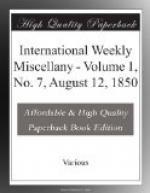The parliamentary debut of M. Rollin took place in 1842. His first speech was delivered on the subject of the secret-service money. The elocution was easy and flowing, the manner oratorical, the style somewhat turgid and bombastic. But in the course of the session M. Rollin improved, and his discourse on the modification of the criminal law, on other legal subjects, and on railways, were more sober specimens of style. In 1843 and 1844 M. Rollin frequently spoke; but though his speeches were a good deal talked of outside the walls of the Chamber, they produced little effect within it. Nevertheless, it was plain to every candid observer that he possessed many of the requisites of the orator—a good voice, a copious flow of words, considerable energy and enthusiasm, a sanguine temperament and jovial and generous disposition. In the sessions of 1845-46, M. Rollin took a still more prominent part. His purse, his house in the Rue Tournon, his counsels and advice, were all placed at the service of the men of the movement; and by the beginning of 1847 he seemed to be acknowledged by the extreme party as its most conspicuous and popular member. Such indeed was his position when the electoral reform banquets, on a large scale, began to take place in the autumn of 1847. These banquets, promoted and forwarded by the principal members of the opposition to serve the cause of electoral reform, were looked on by M. Rollin and his friends in another light. While Odillon Barrot, Duvergier d’Haurunne, and others, sought by means of them to produce an enlarged constituency, the member for Sarthe looked not merely to functional, but to organic reform—not merely to an enlargement of the constituency, but to a change in the form of the government. The desire of Barrot was a la verite a la sincerite des institutions conquises en Juillet 1830; whereas the desire of Rollin was, a l’amelioration des classes laborieuses; the one was willing to go on with the dynasty of Louis Philippe and the Constitution of July improved by diffusion and extension of the franchise, the other looked to a democratic and social republic. The result is now known. It is not here our purpose to go over the events of the Revolution of February 1848, but we may be permitted to observe, that the combinations by which that event was effected were ramified and extensive, and were long silently and secretly in motion.
The personal history of M. Rollin, since February 1848, is well-known and patent to all the world. He was the ame damnee of the Provisional Government—the man whose extreme opinions, intemperate circulars, and vehement patronage of persons professing the political creed of Robespierre—indisposed all moderate men to rally around the new system. It was in covering Ledru Rollin with the shield of his popularity that Lamartine lost his own, and that he ceased to be the political idol of a people of whom he must ever be regarded as one of the literary glories and




